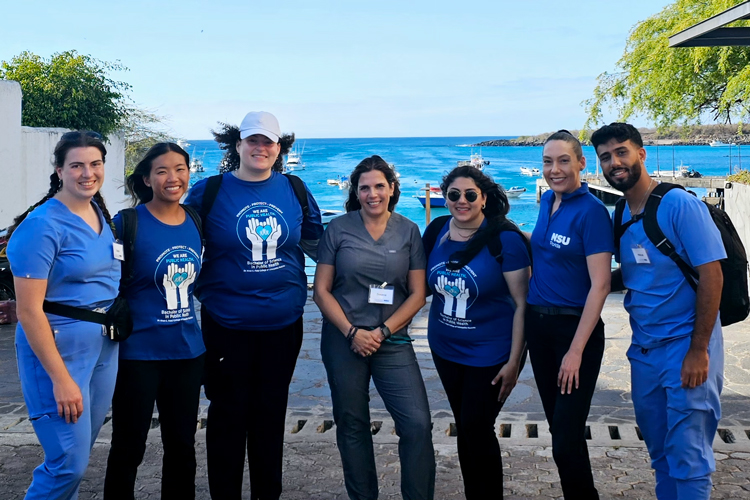Lead the Future of Public Health with an M.P.H. from NSU
Meet the growing demand for public health leadership with a Master of Public Health degree from Nova Southeastern University’s College of Osteopathic Medicine. Our comprehensive curriculum equips you with a deep understanding of social, environmental, demographic, and political factors that shape public health. Graduate with the tools and expertise to make a meaningful impact—wherever your passion leads you.
Flexible Learning, Unlimited Possibilities
Whether you prefer learning online live or on campus, our evening M.P.H. classes are designed to fit your schedule. Both formats offer the same rigorous curriculum, taught by the same expert faculty, so you can unlock your potential without compromising your lifestyle.
Get the NSU Edge
Don’t just be another fish in the school. Be a Shark. That’s the NSU Edge. And as a student in the Master of Public Health program, you’ll:
- Discover how public health education complements all health professions degrees.
- Become a leader of public health programs and services.
- Benefit from the wide-ranging expertise and perspectives of faculty members and students.
- Experience a fully accredited Master of Public Health program.
Quick Facts
For Summer Admission: April 15
For Fall Admission: August 1
Have questions about the program or classes?
Please book a meeting with Dr. Serna Chair of the
Department of Public Health and Director of the Master of Public Health (MPH) program.
You can also reach her via email at cserna@nova.edu
Potential Career Paths
Public Sector
Work as an epidemiologist, environmental health scientist, or public health officer in government or nongovernment health agencies and health care facilities.
Private Sector
Join the continuously growing corporate sector in public health as a consultant or researcher.
Education System
From pre-K to postgraduate, find your place in public or private education as a health educator, a health communications specialist, or university faculty.
Nonprofit
Serve community-based health promotion and planning organizations as a health service manager, director of programs, or health policy director.
Why Earn Your M.P.H. at NSU?
Nationally Ranked Programs
NSU’s programs are top-ranked, with national recognitions including Best Online Master’s in Public Health by Fortune.

Comprehensive Accreditation

M.P.H. Curriculum
Through a combination of core courses and electives, the M.P.H. curriculum includes comprehensive teachings about public health as well as unique opportunities to explore skill sets like global health, communications, and more.
Explore Public Health as a Non-Degree Seeking Student

If you’d like to take a few courses for exploration, professional development, or prep for another track, you can enroll as a non-degree seeking student and take up to four courses (12 credits). You must still apply, send in your transcripts, and pay the application fee.
If you decide later to pursue the M.P.H. degree, you will need to submit a new application. Your previous application does not guarantee acceptance into the M.P.H. degree-seeking program.
Graduate students from other NSU programs who elect to take public health courses may do so with written approval of the public health program director.
After Applying, What Happens Next?
Depending on the time of year, the review process may take a few weeks. You can check your application status at any time via the online application portal. Once a decision has been made, notification is sent via email to the address on file.








